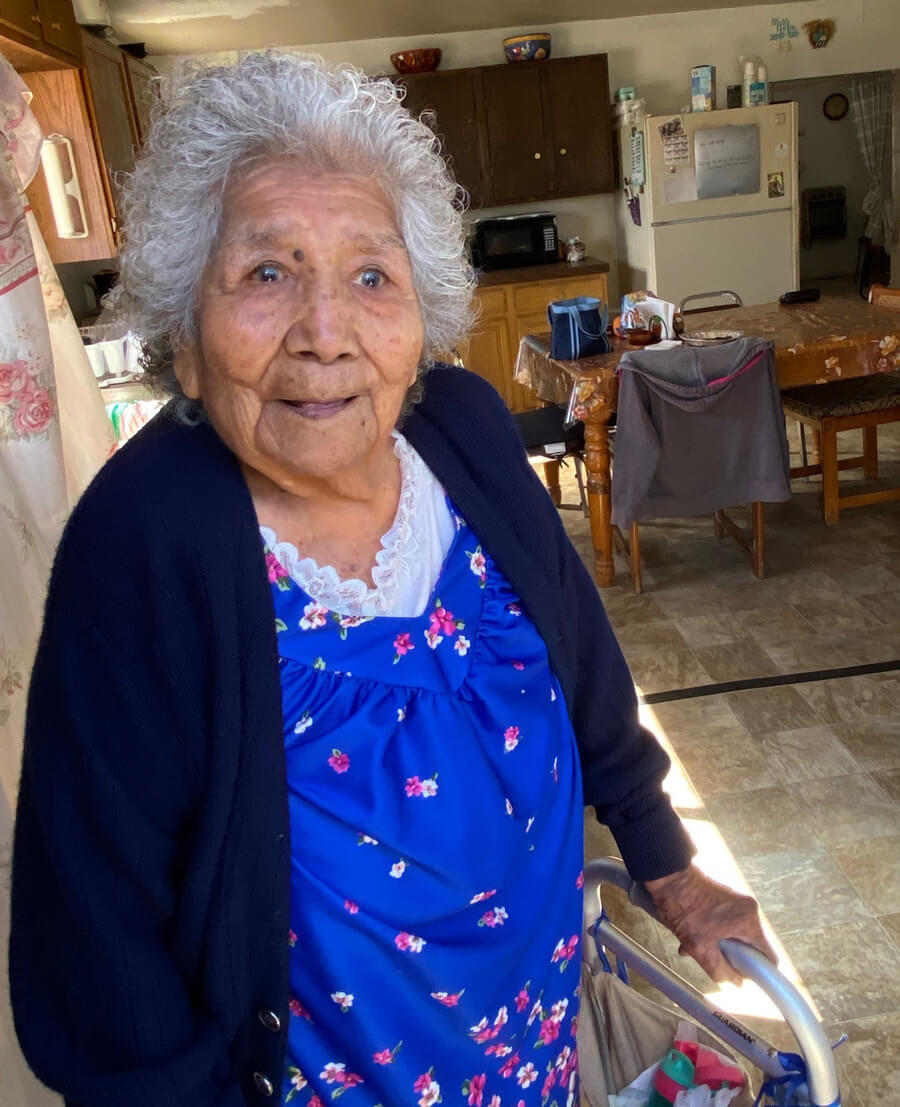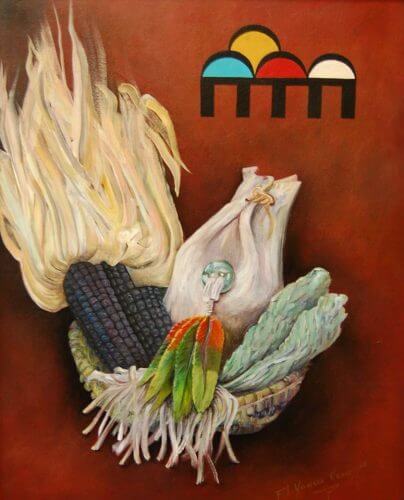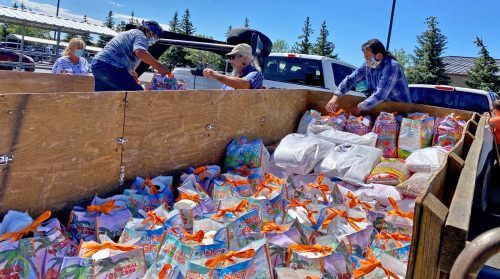The Hopi Tribe declared a state of emergency March 23, 2020. For the health and safety of the whole tribe, Hopis were required to stay in their homes on their remote reservation in northeastern Arizona.
This emergency state was lifted in 2022, but covid safety practices are still recommended and there is on-going need for support.
“Hopi Faith”. This basket of medicinal items is a well wishing for everyone by Hopi artist Fil Kewanyama who says: This symbolizes a positive message that you will have faith in a good outcome. The Earth will heal itself and we will be OK.
“Hopi Faith” by Fil Kewanyama (shared with permission)
During the State of Emergency Gatherings were prohibited.
Villages are closed to non-residents and security checkpoints in place.
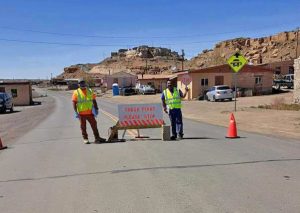
Checkpoint on road into Mishongnovi and Shipaulovi, 4-24-20
Many Hopi people were in need of hygiene supplies and groceries.
A few of the villages have small stores. However, those who have vehicles to travel to them, find mostly empty shelves. The nearest major stores are 60 to 90 minutes away in the cities of Flagstaff or Winslow, Arizona.
Stores on the adjacent Navajo Reservation also have insufficient supplies. In addition, the Navajo Nation is closed to visitors because all of Navajoland is impacted by coronavirus cases.
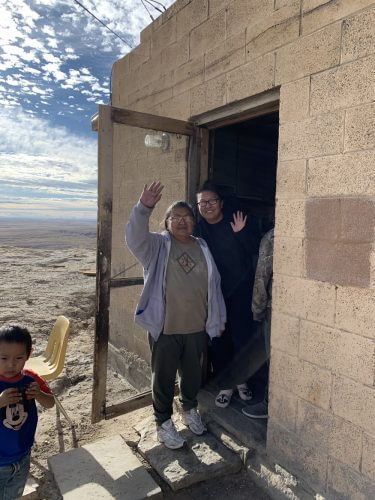
Hopi family visit during Crossing Worlds Hopi Projects December, 2019 Hopi Holiday Project, an annual program since 1999. Photo by Chris-Duffy Wentzel.
The Hopi Tribe is a sovereign nation of more than 1.5 million acres. There are 12 Hopi villages on three mesas.
Hopi youth are out of school and most do not have home internet access. Few Wifi hotspots exist across the entire 1.5 million acres of the Hopi nation.
Hopi has about 19,000 enrolled members; about 9,000 Hopis live on the reservation. 280 covid cases have been identified at Hopi as of 7-13-20.
Navajo has about 298,000 enrolled members; over 173,000 Dine live on the reservation. Navajo has 8,734 cases, 432 confirmed deaths as of 7-23-20.
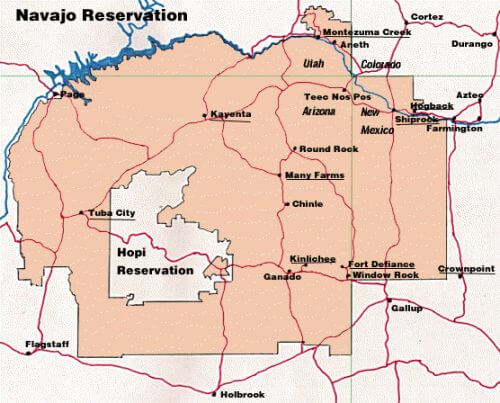

Post-pandemic on-going support projects:
Hopi Kids Learning Enrichment Support Needed for Youth in the Village of Shungopavi-–see info here
Hopi Holiday Project and year-round support for Hopi Families–-see info here
Crossing Worlds Hopi Projects
HOPI FAMILY SUPPORT PROJECT DURING CORONAVIRUS EMERGENCY
July 2020 project: Food and Hygiene Supplies to support Hopi people in the traditional Village of Shungopavi.
A concerned group from the Hopi village of Shungopavi see the coronavirus is spreading fast and are concerned about the safety of people in their village.
Transferring food and hygiene supplies to Hopi trailer in Flagstaff July 6, 2020
“We are reaching out for supplies for the village that will sustain life and the health of our people. We want to have all the necessities they need on hand so we can secure the village and do our best to kill the virus in our village. This will allow people to stay in place and not leave the village for as long as needed.” (Shungopavi Cultural Arts spokesman)
“Today, Shungopavi is the sole remaining Hopi Village that still maintains and performs the complete Traditional Ceremonial Cycle. It is the last Sovereign Hopi Village with a fully Initiated Kikmongwi with all of the original Highly Initiated Religious Leaders that complete the full yearly Ceremonial Cycle.”
(source: Village of Shungopavi website).
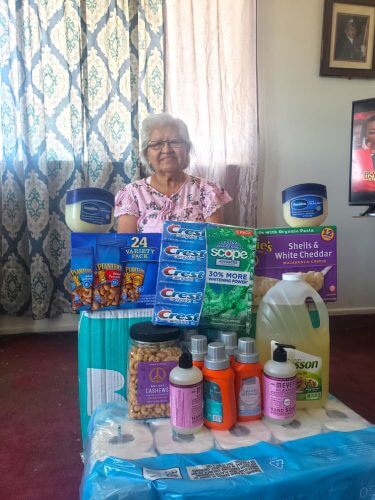
A happy Hopi recipient of one of hygiene & food boxes.
March – June 2020 Covid emergency support project. We shipped boxes of hygiene, food supplies and youth learning supplies to Hopi families and elders in several villages.
Hopi community volunteers provided us shipping addresses for families and seniors in need.
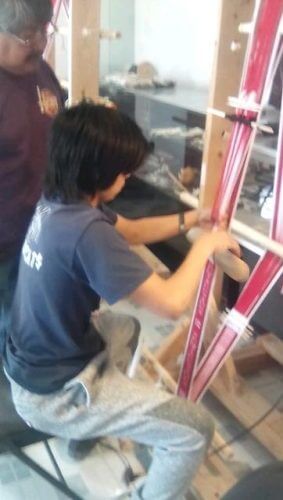
A Hopi youth group learning weaving skills and its meaning within Hopi culture.
Activities for Hopi youth, who are out of school, are also important. For example, we sent personalized, age-specific art, learning supplies and other in-home activities to households.
The main employment, selling Hopi art, is impacted as tourism is not happening. We invite opportunities for Hopis to make linkages to sell their art with the outside world.
THANK YOU FOR YOUR SUPPORT FOR HOPI PEOPLE.
HOPI TRIBE INFORMATION
The Hopi Tribe Emergency Operations Center
During the Start of Emergency, HERC was set up and operated out of the Hopi Veteran’s Memorial Center site in Kykotsmovi, Arizona.
This wasthe staging area for bulk emergency supplies shipped to the Hopi Tribe through federal, state and private sources.
928-734-3661 or 928-734-3663.
Operational hours were from 8:00 a.m. – 5:00 p.m. Monday – Friday.
Hopi Foundation Emergency Assistance Fund
The Hopi Foundation has established a fund to provide assistance to those in need during emergency situations.
The Hopi Foundation is a non-governmental, Hopi-operated 501(c)(3) nonprofit that focuses on strengthening the community by improving the skills and resources of its community members.
“Their Emergency Assistance Fund is just one of several services provided by The Hopi Foundation. Many of the services their programs provide — substance abuse mentoring, farming workshops, leadership trainings, free tax services — are stalled with the current quarantine policies.
One of their programs, KUYI – Hopi Radio, is at the front lines of providing Hopi communities with current and important news regarding COVID-19.”
(source: Hopi-Navajo Observer, 4-24-20)
“The Hopi Foundation Emergency Assistance Fund offers aid to local villages, organizations and individuals with the intent to distribute supplies and resources to groups in critical need, such as low-income households, elders, single-parents, those with disabilities, or people with little-to-no access to transportation.”
(source: The Hopi Foundation)
HOPI Values
“Since time immemorial the Hopi people have lived in Hopitutskwa and have maintained our sacred covenant with Maasaw, the ancient caretaker of the earth, to live as peaceful and humble farmers respectful of the land and its resources. Over the centuries we have survived as a tribe, and to this day have managed to retain our culture, language and religion despite influences from the outside world.”
source: Hopi Tribe official site
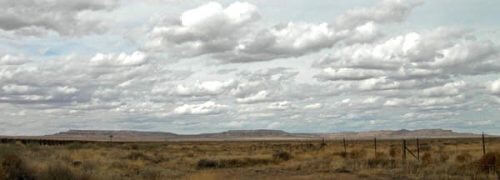
View of Second Mesa area of Hopi from the south by Sandra Cosentino.
